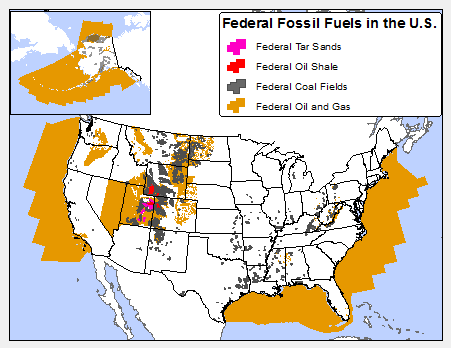KEEP IT IN THE GROUND
Pollution from the world’s currently operating oil, gas, and coal fields, if developed, would push warming well past 1.5°C, bringing dangerous extreme weather, flooded coasts, wildfires, human health catastrophes and sweeping wildlife extinctions.
In other words, our climate can’t afford any new fossil fuel development.
That’s why, since 2015, the Center has campaigned to keep it in the ground — to stop the expansion of oil, gas, and coal development on public lands and oceans by halting new leasing and permitting.
Existing laws give presidents the authority to end new federal fossil fuel leasing. Hundreds of organizations have petitioned the federal government to end new onshore and offshore leasing. Before President Biden’s inauguration, the Center and more than 500 other groups called on Biden to enact his commitment to “banning new oil and gas leasing on public lands and waters.”
The campaign’s success is shown in the Biden administration’s pledge to ban new oil and gas leasing on public lands and oceans. We’re now focused on ensuring that the ensuing environmental review aligns energy policy and climate goals by phasing out federal fossil fuel development.
Our Public Carbon Estate
Our public lands and oceans provide enormous environmental benefits, from clean air, water and natural ecosystems to habitat for some of our most imperiled wildlife. But they also contain vast carbon stores — fossil fuels that, if developed, would spell disaster for the world's climate.
Fossil fuel production on public lands and oceans causes about a quarter of U.S. greenhouse gas pollution. Peer-reviewed science estimates that a nationwide federal fossil fuel leasing ban would reduce carbon emissions by 280 million tons per year, ranking it among the most ambitious federal climate-policy proposals.
In a landmark 2015 report, The Potential Greenhouse Gas Emissions of U.S. Federal Fossil Fuels, EcoShift Consulting, on behalf of the Center for Biological Diversity and Friends of the Earth, completed the first-ever estimate of the volume and potential life-cycle greenhouse emissions of nonfederal and publicly owned federal fossil fuels.
A second landmark report, Over-leased: How Production Horizons of Already Leased Federal Fossil Fuels Outlast Global Carbon Budgets, shows that the federal fossil fuels already leased to industry will still be producing fossil fuels long after global carbon budgets for international warming targets have been exhausted. In other words, we've already leased too much.
A third report, Grounded The President’s Power to Fight Climate Change, Protect Public Lands by Keeping Publicly Owned Fossil Fuels in the Ground, was the first to detail the executive authorities by which a President, without Congress, could end new federal fossil fuel leasing on public lands and oceans.

Toward a None-of-the-above Fossil Fuel Policy
As global warming threatens to accelerate the extinction crisis, the highest and best use of our public lands and oceans is to provide safe harbor for diverse species by protecting the ecological systems upon which they, and we, ultimately depend.
Yet despite dire warnings, the Trump administration, under its “all-of-the-above” energy policy, continued to sacrifice those habitats to the fossil fuel industry.
More than 67 million acres — an area 55 times larger than Grand Canyon National Park — are now leased.
The “all-of-the-above” policy comes at a high cost for our natural and national heritage. It industrializes America's public lands, pollutes pristine rivers and coastlines, endangers underprivileged communities, and pushes wildlife closer to extinction.
And it's a recipe for climate disaster: Each new federal fossil fuel lease commits the world to more climate disruption.
Fighting climate pollution by only regulating smokestacks and tailpipes is a fool's errand; fossil fuels that are extracted will be burned — so tackling the climate crisis requires policies that sever the fossil fuel supply.
Our public lands and oceans, which afford critical ecological and biological values, are the place to start. Now.
